News
20242023202220212020
In The News: URMC utilizes motion capture technology to study brain, how it ages
Wednesday, December 26, 2018
The following is an excerpt from an article by Norma Holland that originally appeared on WHAM 13:
Rochester, N.Y. -- From Hollywood to Healthcare: Technology used to make movies is being used at the University of Rochester Medical Center to help scientists understand the brain and how it ages.
What researchers learn could help predict a person's risk of developing Alzheimer's disease.
13WHAM watched researchers in the Mobile Brain Body Imaging -- or MoBi -- Lab attach wires to a cap covered in electrodes. The cap picks up the brain wave activity of a volunteer, while infrared cameras surrounding him pick up how his body moves on a treadmill.
This lab is one of 12 around the world combining motion capture technology with brain scans used in real time.
"What we're saying is: Let's get people up, let's get them in a walking situation where they're solving a task, where we can kind of stress them a bit, and then we can ask, 'How's the brain working under duress?' explained Dr. John Foxe, director of the Del Monte Institute for Neuroscience. "And that gives us a window into function, maybe like a neural stress test, akin to the cardiac stress test."
Armed with that information, doctors hope to one day be able to predict a person's dementia risk a decade before symptoms show up. It can also help give us clues about a person's risk of falling as they get older.
Chavali, Couch, DeZoysa and Hao Win Sayeeda Zain Travel Award
Tuesday, December 18, 2018
The department is pleased to announce the winners of the Sayeeda Zain Fall Travel awards: Shashank Chavali, Tyler Couch, Meemanage Dudarshika DeZoysa and Fanfan Hao.
The Sayeeda Zain Travel Award honors the distinguished career and charitable life of Dr. Sayeeda Zain. The award is given in recognition of research excellence to support travel and related expenses associated with attendance at a scientific conference or corporate internship to gain practical experience. The next round of Sayeeda Zain Travel Awards will be offered in Spring 2019.
Thank you to all those who applied and congratulations to Shashank, Tyler, Dudarshika and Fanfan!
Study: Neurons in the Brain Work as a Team to Guide Movement of Arms, Hands
Tuesday, December 11, 2018
 The apparent simplicity of picking up a cup of coffee or turning a doorknob belies the complex sequence of calculations and processes that the brain must undergo to identify the location of an item in space, move the arm and hand toward it, and shape the fingers to hold or manipulate the object. New research, published today in the journal Cell Reports, reveals how the nerve cells responsible for motor control modify their activity as we reach and grasp for objects. These findings upend the established understanding of how the brain undertakes this complex task and could have implications for the development of neuro-prosthetics.
The apparent simplicity of picking up a cup of coffee or turning a doorknob belies the complex sequence of calculations and processes that the brain must undergo to identify the location of an item in space, move the arm and hand toward it, and shape the fingers to hold or manipulate the object. New research, published today in the journal Cell Reports, reveals how the nerve cells responsible for motor control modify their activity as we reach and grasp for objects. These findings upend the established understanding of how the brain undertakes this complex task and could have implications for the development of neuro-prosthetics.
"This study shows that activity patterns in populations of neurons shift progressively during the course of a single movement," said Marc Schieber, M.D., Ph.D., a professor in the University of Rochester Medical Center (URMC) Department of Neurology and the Del Monte Institute for Neuroscience and a co-author of the study. "Interpreting these shifts in activity that allow groups of neurons to work together to perform distinctive and precise movements is the first step in understanding how to harness this information for potential new therapies."
Rochester graduate student named Schwarzman Scholar
Friday, December 7, 2018
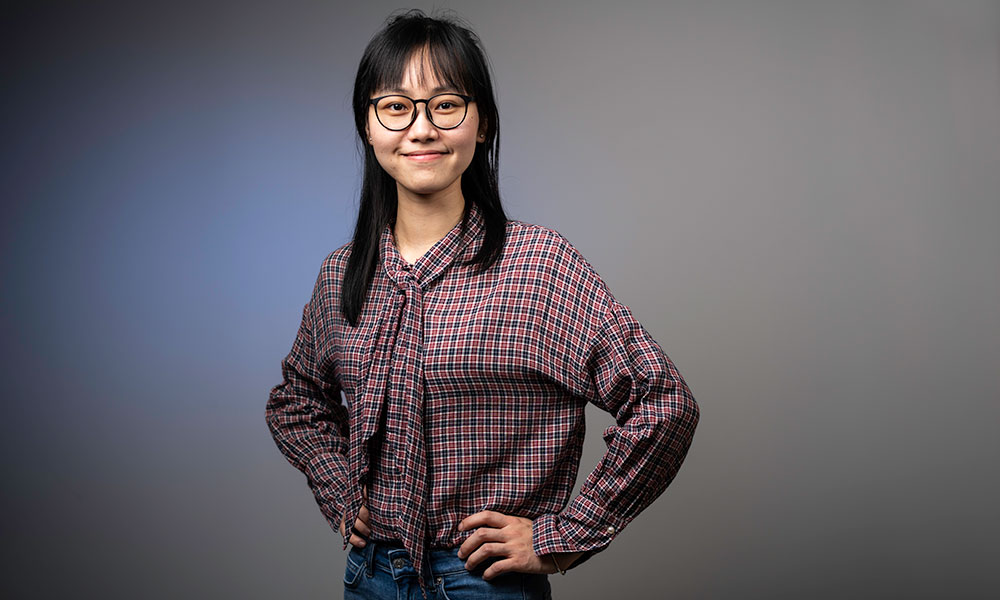
University of Rochester graduate student Beixi Li is one of 140 students selected worldwide as a Schwarzman Scholar. (University of Rochester photo / J. Adam Fenster)
University of Rochester graduate student Beixi Li has been named a 2019-20 Schwarzman Scholar, one of about 140 selected worldwide for this prestigious graduate fellowship. She'll develop leadership skills and professional networks in a one-year master's program at China's elite Tsinghua University in Beijing, beginning next August.
"I'm really excited," the Shanghai, China, native says. "After going through the application process and long interview sessions, it was great to know that everything I did was worth the effort. I'm thrilled to be part of this program."
The international fellowship was established in 2016 with a $100 million donation by philanthropist Stephen Schwarzman, whose goal was to prepare the next generation of global leaders by providing an unparalleled opportunity to gain some understanding of China through an immersive experience. Students pursue a master's degree in global affairs, with concentrations in public policy, economics and business, or international studies. They spend a year in an international community of thinkers, innovators, and leaders in business, politics, and society.
Nearly 2,900 candidates from around the world applied.
Li is currently pursuing a master of public health degree at Rochester's School of Medicine and Dentistry and expects to graduate in May. Her thesis examines the potential impact of maternal dental amalgams (fillings) on offspring neurodevelopment.
As a Schwarzman Scholar, Li intends to concentrate in public policy. She plans a career in preventive medicine, with a focus on children, in the fields of environmental hazards, tobacco control, or infectious diseases.
"The world today is facing various public health issues, like environmental pollution, the Ebola viruses in Africa, the opioid epidemic in the United States, and smoking abuse among teens and adults," Li says. "I've always believed that preventive medicine and public health are the most effective ways to save the lives of millions in the world."
Li is the first Rochester recipient since Jintian (Jay) Li '12 (no relation) was selected to the inaugural class. Suman Kumar '19, a mechanical engineering major from Lalitpur, Nepal, was a Schwarzman Scholar semifinalist and one of around 400 who reached the interview stage of the competition.
"We are delighted and proud to have another Rochester student join the ranks of Schwarzman Scholars and hope that Beixi's selection will inspire more students, including those in graduate and professional degree programs, to consider applying in the future," says Belinda Redden, director of the Fellowships Office.
Li earned her undergraduate degree in preventive medicine from Xiangya School of Medicine at Central South University in Changsha, China, and is a licensed medical doctor in her native country. She began her Rochester graduate study program in fall 2017.
US News and World Report Article: What You Can Do With a Biology Degree?
Tuesday, December 4, 2018
Recently the US News and World report website published an article discussing what you can do with a biology degree. The article features input from URBEST Executive Director, Tracey Baas.
The article goes into detail on the types of jobs a graduate can expect, the variety of roles pursuing such a degree opens up for you including industry options while detailing further academic choices. To read the entire article, visit the US News and World Report Website
Professor Harold Smith, Ph.D. appears on Evan Dawson Radio Program
Thursday, November 29, 2018
Harold C. Smith was a guest along with Bob Duffy (CEO of the Greater Rochester Chamber of Commerce), Jason Klimek (attorney with Boylan Code), Zachary Sarkis (co-founder of Flower City Solutions) and Jacob Fox (founder of Closed Loop Systems) on WXXI Connections with Evan Dawson on 11/21/2018 to address the opportunities and questions surround the emerging hemp industry in Up State NY. (listen to Hemp101http://www.wxxinews.org/programs/connections?page=1&ajax=1)
Dr. Smith spoke regarding the future of labeling and dosing of THC-free and THC-containing products relative to what we understanding from scientific and clinical research. Having founded CannaMetrix, LLC, a New York based company, Dr. Smith seeks to establish through patent pending, cell-based assays, to raise the standards for product development and quality control so as to better information patient choices of products containing full spectrum plant cannabinoids or synthetic cannabinoids and advance medicinal use of cannabis.
Jean Bidlack Featured on WXXI's Second Opinion
Wednesday, November 28, 2018
Professor of Pharmacology and Physiology, Jean Bidlack, Ph.D. and her research were recently featured on WXXI's Second Opinion.
The Medical Innovations segment will air with the "Alcoholism" episode on WXXI where Dr. Bidlack discusses how when dopamine levels spike in the brain, it leads to the very strong reinforcing properties of addiction.
The program will air Thursday January, 3rd at 8:30pm but can be viewed below as well.
23rd WCI Scientific Symposium
Thursday, November 15, 2018
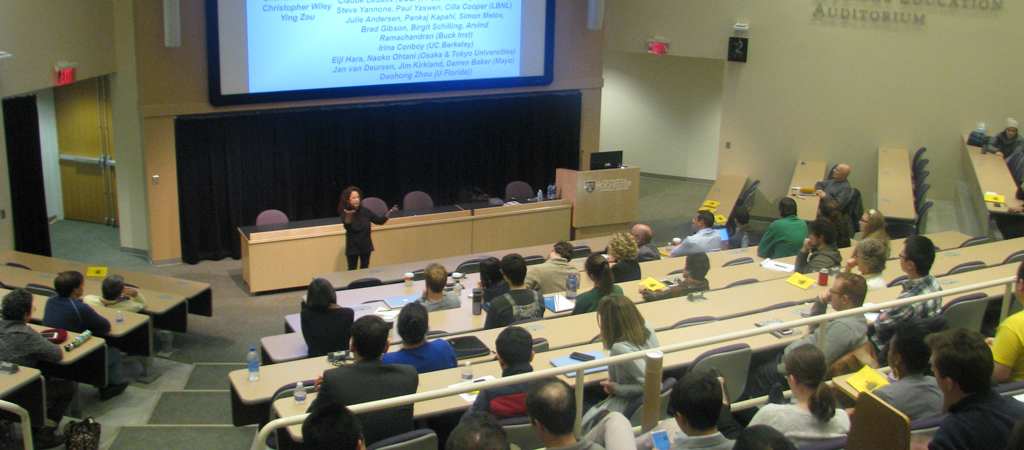
Keynote Lecture in Progress

Supriya Mohile, M.D., M.S.
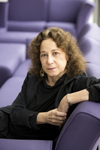
Judith Campisi, Ph.D.
"This week GDSC assisted the Wilmot Cancer Institute (WCI) in hosting their Twenty Third Scientific Symposium for Cancer Research and Treatment. Graduate Students working in basic, translational and clinical cancer research displayed posters of their respective cancer studies in the Flaum Atrium. GDSC and other faculty gave lectures; including Brian Altman, Stephano Mello, Dirk Bohmann, Vera Gorbunova, Joe Chakkalakal, Laurie Steiner, and Ben Frisch. Additionally, WCI professor Supriya Mohile, gave the Davey Award Lecture titled Improving Care Delivery for Older Patients with Cancer. Finally, Judith Campisi, Ph.D. of the Buck Institute for Research on Aging and USC Leonard Davis School of Gerontology presented the symposium's keynote lecture titled "Cancer and aging: Rival Demons?"
Congratulations to Phong Nguyen and Jose Suarez Loor for receiving ORS Travel Awards!
Thursday, November 15, 2018
Congratulations to PhD students Phong Nguyen and Jose Suarez Loor for receiving Orthopaedic Research Society (ORS) Travel Awards to attend the 2018 ORS Tendon Section Conference in Portland, OR! For more information, please see here: https://www.ors.org/tendon-2018-conference/
URMC Student/Trainee Travel Awards 2018 Request for Applications
Tuesday, November 13, 2018
Two travel reimbursement awards of up to $1,000 will be given this funding cycle (one for clinical research and one for basic sciences research) to support a University of Rochester School of Medicine & Dentistry medical student, graduate student, postdoctoral trainee, clinical resident, and/or clinical fellow to attend important national or international meetings at which they will present their research and make professional connections.
Eligible applications for the current cycle are for travel between September 1, 2018 and February 28, 2019. Submission Deadline: Friday, December 14, 2018, 6:00 pm. For questions, email Amy Blatt, M.D. or call 585-275-4912.
View the full RFA.
Congratulations Eugene!
Monday, November 12, 2018
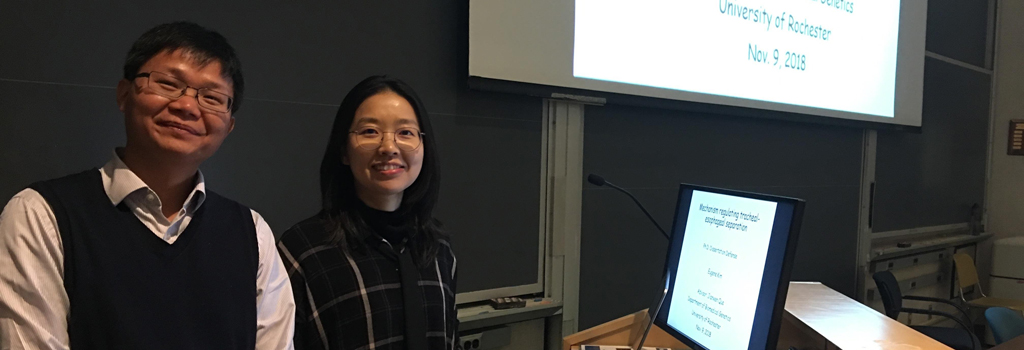

We celebrated the successful PhD defense by Eugene Kim last Friday. Working with Jianwen Que, Eugene has identified a significant progenitor cell population in the early foregut. She used a combination of xenopus and mouse models to demonstrate that the transcription factor Isl1 enriched in the unique progenitor population regulates the separation of the esophagus from the trachea. These findings provide important insights into the pathobiology of a relatively common birth defect esophageal atresia with/without trachea-esophageal fistula (EA/TEF). Eugene has a passion for studying developmental biology and stem cells in regeneration, and she plans for a future career in these areas!
Congratulations to the 4th Annual Immune Imaging Symposium Poster and Image Winners
Monday, November 12, 2018
Wish the four winners a hardy congratulations when you see them.
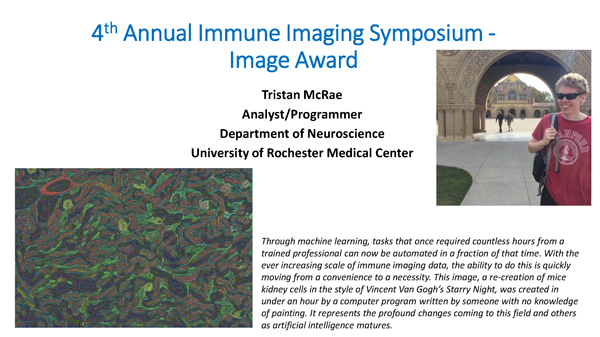

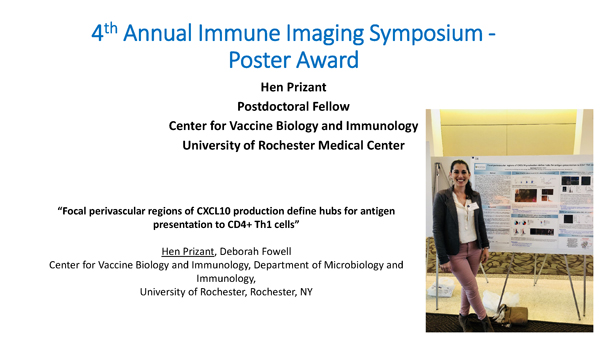
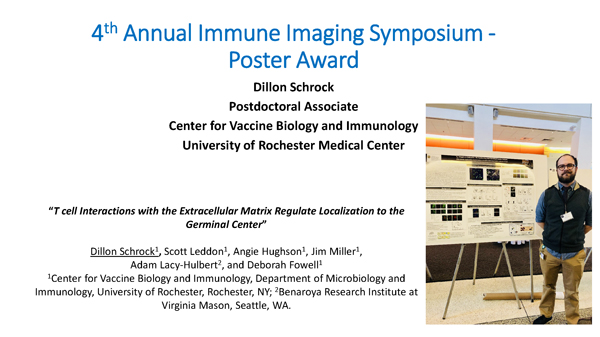
Congratulations Fanju!
Thursday, November 8, 2018
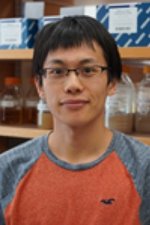
On Thursday, Fanju Meng successfully defended his PhD thesis. Under mentorship of Dr. Benoit Biteau, Fanju's studies focus on the regulatory network that coordinates stem cell proliferation and differentiation in the Drosophila intestinal epithelium. Using advanced fly genetics and cell biology methods, Fanju characterized the expression and role of several transcription factors in adult intestinal progenitors. His work significantly improves our understanding of the programs controlling stem cell function and establishes the fruit fly as a model to study these conserved, critical stem cell factors. His findings have been published in Cell Reports and Stem Cell Investigation. And there are additional papers in the pipeline! Fanju was a recipient of a NYSTEM training grant hosted by the Department of Biomedical Genetics, and the Goodman Doctoral Dissertation Fellowship from the University of Rochester. Fanju is now planning on continuing in his work in the field of stem cell and cancer biology using genetic model organisms -- and we wish him the best of luck! You will be missed.
For further reading, please see:

Fanju Meng Successfully Defending His Ph.D. Thesis
GDSC Halloween Costume Contest!
Thursday, November 8, 2018
Last week GDSC held our Halloween Costume Contest. Our three GDSC student contestants can be seen below.

Derek Crowe as Bart Simpson

Anne Roskowski as Sailor Moon

Neal Shah as a Medical Garbed Squidward
Derek Crowe earned a very close second place with 14 votes. While first place went to Anne Roskowski with 15 votes. Congrats Anne!"
Dumont Receives 2018 Outstanding Graduate Student Teacher Award
Tuesday, November 6, 2018
Biochemistry professor Mark Dumont, Ph.D. is the recipient of the 2018 Outstanding Graduate Student Teacher Award. Established in 2013, this award is given to an outstanding graduate student teacher for record of excellence in classroom instruction. Mark was nominated by graduate students Brandon Davis, Ashwin Kumar and Matthew Raymonda.
This award was presented at the School of Medicine and Dentistry Convocation Ceremony, September 6, 2018.
The department would like to extend congratulations to Mark on this well- deserved honor.
GDSC Fall Retreat
Thursday, November 1, 2018
Our graduate program in Genetics, Development and Stem Cells (GDSC) celebrated another successful season of research
and academic growth. On the afternoon of Friday October 26th 2018, the faculty, students and families of GDSC held
our Fall Retreat at the Ellison Park Pavilion Lodge. Among our many reasons to celebrate was our Department's
recent faculty expansion including, Brian J. Altman, Stephano Spano Mello, and Patrick J. Murphy. Welcome! We also
celebrated the faculty promotion of Benoit Biteau to Associate Professor. Finally, we celebrated the future research
of faculty members Margot Mayer-Pröschel, Douglas Portman, Chris Pröschel, and Andy Samuelson each of whom
obtained prominent research grants earlier this year. Our festivities included pumpkin carvings, board games and a
cocktail hour. There were also three hotly contested rounds of Science Trivia. (The final scores for the first and
second place teams were separated by a margin of half a point!) The winning team "Smooth ER" included
members Derek Crow, Li Xie, Shen Zhou, Yungeng Pang, Mark Noble, Daxiang Na, and Andy Samuelson. Additionally,
Jessie Hogestyn won our "Hidden Facts" contest testing one's knowledge of eccentric or esoteric
trivia regarding GDSC faculty and students. Photos of GDSC's genetic festivities can be seen below.
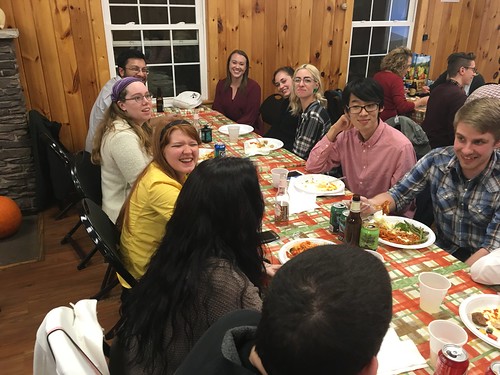
CMPP Graduate Student Published in Nature Communications
Wednesday, October 24, 2018
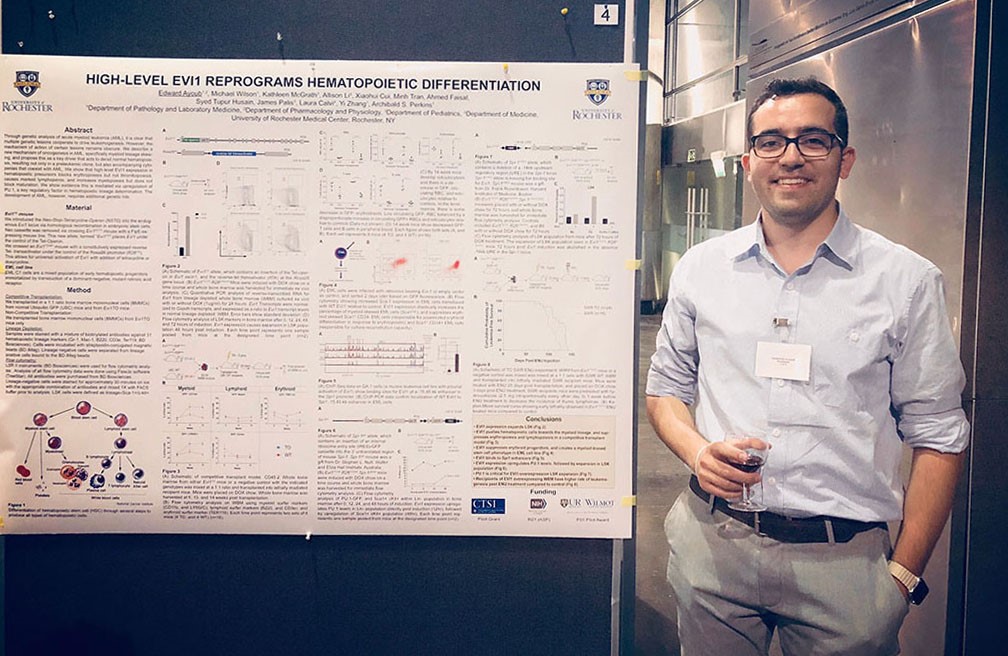 Edward Ayoub, a Graduate student in the Cellular and Molecular Pharmacology and Physiology PhD Program and member of Archibald Perkins Lab published in Nature Communications on 10/12/2018. More information can be found on the Nature Website.
Edward Ayoub, a Graduate student in the Cellular and Molecular Pharmacology and Physiology PhD Program and member of Archibald Perkins Lab published in Nature Communications on 10/12/2018. More information can be found on the Nature Website.
Paper Title & Abstract
EVI1 overexpression reprograms hematopoiesis via upregulation of Spi1 transcription
Edward Ayoub, Michael P. Wilson, Kathleen E. McGrath, Allison J. Li, Benjamin J. Frisch, James Palis, Laura M. Calvi, Yi Zhang & Archibald S. Perkins
Inv(3q26) and t(3:3)(q21;q26) are specific to poor-prognosis myeloid malignancies, and result in marked overexpression of EVI1, a zinc-finger transcription factor and myeloid-specific oncoprotein. Despite extensive study, the mechanism by which EVI1 contributes to myeloid malignancy remains unclear. Here we describe a new mouse model that mimics the transcriptional effects of 3q26 rearrangement. We show that EVI1 overexpression causes global distortion of hematopoiesis, with suppression of erythropoiesis and lymphopoiesis, and marked premalignant expansion of myelopoiesis that eventually results in leukemic transformation. We show that myeloid skewing is dependent on DNA binding by EVI1, which upregulates Spi1, encoding master myeloid regulator PU.1. We show that EVI1 binds to the −14 kb upstream regulatory element (−14kbURE) at Spi1; knockdown of Spi1dampens the myeloid skewing. Furthermore, deletion of the −14kbURE at Spi1 abrogates the effects of EVI1 on hematopoietic stem cells. These findings support a novel mechanism of leukemogenesis through EVI1 overexpression.
Research Roundup: Values
Monday, October 22, 2018
Stephen Dewhurst, Ph.D., Vice Dean for Research
A couple of weeks ago, I gave a presentation at the URBEST retreat, entitled "Mentoring Lessons: What my students have taught me". It was a Pecha Kucha style talk - 20 slides, 20 seconds each; a little over 6 minutes total.
My ratio of prep time to presentation time was frightening. But the process of constructing the talk was incredibly rewarding, because it forced me to reflect on the moments when my students have shown me - through their words and actions - what matters most.
I'm referring to those moments when others teach us something important about ourselves, about our interconnectedness, and even about the workplace culture we aspire to create around us. We've all experienced moments like these. Moments that, even years later, can still inspire tears and feelings of deep gratitude.
As I was putting my slides together, I got to thinking about Tony Broyld - who I first met as a middle schooler at Clara Barton School #2 in the City of Rochester. He's now a Systems Engineer in his early 30s with two M.S. degrees from the University of Rochester and living in the greater New York City area. He is also the first member of his family to go to college. Someone in whose life I was fortunate enough to make a real and profound difference and also someone who taught me a great deal about resilience.
If he were the only student who taught me something important about values, about what matters, this would be a short column. But of course, he wasn't.
Almost every day, I find myself in awe of the people I'm privileged to work with.
Recently, I attended the annual picnic in my home department of Microbiology and Immunology. One of our students spoke to me about her journey to graduate school. How the kindness of a single mentor changed the course of her life, made her believe in herself, helped her see a different future, and brought her here to Rochester.
She spoke also about her father and how he will spend the rest of his life in jail, a measure of how far her life has traveled from the path that it might otherwise have gone down.
She spoke from a place of love and appreciation - and left me feeling intensely honored to be a part of her education.
There are hundreds of stories like hers at our Medical center from people whose lives have been transformed by the power of their own courage and by the drive of their imagination and curiosity. By their desire to learn, by this life in science that we share, and by the values that we talk about -- but don't always appreciate or fully understand -- until we see them up close and personal.
Former Tox Student Claire McCarthy, PhD Featured on NPR
Thursday, October 18, 2018
Early one morning in the spring of 2017, former Toxicology graduate student Claire McCarthy (Sime Lab) started her day as many don't: rolling dried rhinoceros dung into cigarettes and packing them into a machine that smoked them.
Although it might seem bizarre, McCarthy's purpose was serious: She wanted to know what happens when people breathe in dung smoke.
Dung smoke is no joke. Animal dung is used by millions globally for heating and cooking.
It's a dangerous practice. Burning biomass fuels (including animal dung as well as wood, charcoal, and plant matter) generates indoor air pollution, which caused 4 million deaths worldwide in 2012 according to the World Health Organization. Like cigarette smoke, biomass smoke has been linked to increased risk of lung diseases, such as chronic obstructive pulmonary disorder (COPD), lung cancer and respiratory infection.
CMPP Graduate Student Brandon Berry Wins Poster Award
Monday, September 24, 2018
The Wojtovich lab attended the Translational Research in Mitochondria, Aging, and Disease (TRiMaD) Symposium. A yearly event that brings together approximately 150-200 scientists from the Northeast to discuss the role of mitochondria in aging and disease.
Brandon Berry, Graduate Student in Wojtovich lab, was one of four recipients to win a poster award for his work entitled "Novel Optogenetic control of mitochondrial energetics rescues electron transport chain inhibition"
Adrian Moises Molina Vargas is awarded Graduate Alumni Convocation Award
Friday, September 14, 2018
Adrian ('18 University of Alcalá, Spain), one of three new 2018 recruits to the GDSC program was awarded the Graduate Alumni Convocation Award to recognize his promise for exceptional accomplishment in graduate studies. During his year of studying abroad at Tufts during 2017-2018, Adrian worked in the Mirkin lab to study the role of cdc13 mutations in genome instability.
In addition, Sarah Spahr ('18 Ohio State University) was nominated for the Irving Spar Fellowship and Tom O'Connor ('17 University of Buffalo) was nominated for the Newell Stannard Graduate Student Scholarship Award. Congratulations to all three!


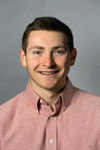
Adrian, Sarah & Tom
GDSC Team Participates in 6th annual Wilmot “Warrior Walk”
Friday, September 14, 2018
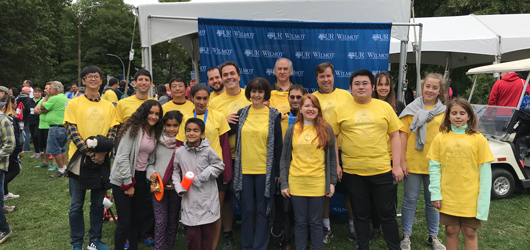
GDSC Team supports the 2017 Wilmot Cancer Warrior Walk
Students and faculty from Biomedical Genetics and the GDSC program attended the 6th Wilmot Cancer Institute Warrior Walk on Sunday. Aptly named the "NextGen Cancer Busters" to symbolize the graduate students and post-docs training to become cancer researchers, the GDSC team mingled with cancer survivors and family members, to support the fight against cancer. As one team member pointed out: "Meeting cancer survivors really helps put the work in the lab into perspective".
In addition to the Cancer Survivor Walk, "NextGen Cancer Busters" also participated in the 10k and 5k events. Notably, Dalia Ghoneim (5k) and Adam Cornwall (10k) and placed 1st and 2nd in their group, and 2nd and 7th overall. In addition, Scott Friedland and our new faculty addition, Brian Altman, both placed 4th in their age group for the 5k. Congratulations!!
Neuroscience Graduate Program Student Receives Award for SfN Trainee Professional Development
Tuesday, September 11, 2018
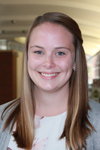 Emily Warner was recently selected to receive a 2018 Trainee Professional Development Award (TPDA) from the Society for Neuroscience. These are highly competitive awards and it is a great achievement for Emily.
Emily Warner was recently selected to receive a 2018 Trainee Professional Development Award (TPDA) from the Society for Neuroscience. These are highly competitive awards and it is a great achievement for Emily.
The award comes with a complementary registration to the conference in San Diego and a monetary award of $1000. Emily will present a poster at a poster session for other recipients and will be able to attend several Professional Development Workshops while at the conference.
Congratulations Emily!
Neuroscience Graduate Program Student Receive 3 Convocation Awards
Wednesday, August 22, 2018
Congratulations to our NGP students for again earning these honors at this year's School of Medicine and Dentistry Convocation Ceremony.
- Kathryn Toffolo (1st year): Merritt and Marjorie Cleveland Fellowship Award
- This fellowship was established in 1991 from Mr. and Mrs. Merritt Cleveland and is awarded to a Ph.D. student entering graduate study through the Biomedical Sciences Program with interest in developing a neuroscience-related research career.
- Monique Mendes (4th year): Outstanding Student Mentor Award
- This award, established in 2015, recognizes a student mentor who guides, supports and promotes the training and career development of others.
- Gregory Reilly (1st year): J. Newell Stannard Graduate Student Scholarship Award
- This scholarship was established by Dr. Stannard, Professor Emeritus, to recognize one deserving incoming graduate student for their commendable academic achievements. Dr. Stannard developed the world's first doctoral program in radiation biology at the School of Medicine and was a faculty member for almost 40 years before retiring in 1975. He taught and mentored hundreds of students who went on to become leaders and experts in the field of radiation health.
Research Roundup: The Loneliness of Grant Writing
Wednesday, August 22, 2018
Stephen Dewhurst, Ph.D., Vice Dean for Research
Almost all of us, as researchers, spend a good deal of our time thinking about grant proposals. That's because grant funding gives us the means to explore our ideas, and to do the things we think are important.
We also all recognize that most grant applications will be rejected by the funding agencies to which we submit them. So we become creatures of persistence.
What's discussed less often, is the actual experience of grant writing.
Its something we all do: at our desks, in coffee shops, at the kitchen table; wherever we can find a space for our laptop. But we don't often talk about how it feels.
There's a strong sense of stepping out of your normal life. For me - and I don't think I'm unusual in this - it involves withdrawing from many of the other things I would normally do. Not only professionally, but also family obligations and social interactions.
This column, for example, was due a week ago. But I deferred it, because I had a grant deadline yesterday.
Grant writing requires us to focus our thoughts to such an extent that we can sink into them; to become fully immersed. The experience is intense, and it is also both lonely and isolating.
That's because the process of writing a grant is an exercise in disconnection. An intentional unplugging.
When I'm writing a grant, I often feel very distant from the people around me. It's as if they're behind glass - because my mind is somewhere else entirely. And then I'll find myself alone in a quiet house, in the middle of the night, with nothing but my own thoughts for company. Struggling to find the right words.
What makes this more bearable is remembering why we're asking for the money - what we plan to do with it - and knowing also that this is a shared experience, common to all academic scientists. It's a part of the life we choose.
Those late nights, those doubts, those uncertainties - we've all been there. It's one of the things that bond us together.
So I wanted to take a moment to acknowledge the hundreds of researchers at the medical center who are engaged in grant writing on any given day. It's their efforts that make the URMC's research enterprise possible, and that make this a special place where discoveries happen every day.
School of Medicine Names New Dean for Graduate Education
Tuesday, August 21, 2018
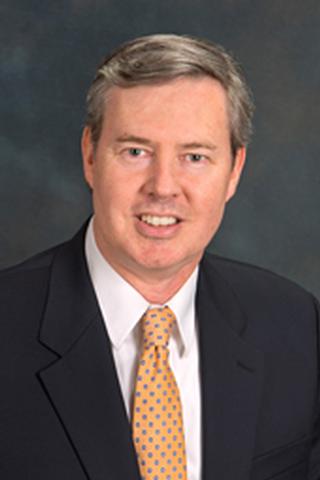
Richard T. Libby, Ph.D.
Richard T. Libby Ph.D., professor of Ophthalmology and of Biomedical Genetics at the University of Rochester School of Medicine and Dentistry, and a member of the University's Center for Visual Science, has been named Senior Associate Dean for Graduate Education and Postdoctoral Affairs (GEPA), pending approval of the University Board of Trustees. Beginning Sept. 1, Libby will direct the School of Medicine and Dentistry's Ph.D., postdoctoral and master's degree programs. He succeeds Edith M. Lord, Ph.D., who served a decade in the role and is shifting her focus to microbiology and immunology research.
An innovative researcher in the neurobiology of glaucoma, Libby arrived in Rochester in 2006 after postdoctoral and fellowship experiences that enlightened him on the power of model genetics systems in the study of eye disease. Years spent training at the Medical Research Council's Institute for Hearing Research in Nottingham, England, and the Jackson Laboratory in Bar Harbor, Maine, formed the foundation for his current laboratory, which is focused on understanding the cell signaling pathways that lead to vision loss in glaucoma.
Libby is director of the Cell Biology of Disease Graduate Program, has served on numerous academic committees integral to research activities and graduate education, and is a respected mentor and teacher. He has published, as author or co-author, more than 60 peer-reviewed scientific articles and numerous reviews, book chapters and commentaries, and has presented internationally on a range of topics in eye and vision research.
"Rick understands that excellence in a research enterprise is essential to attracting the best and brightest talent and has articulated a vision for further improving the experience here, making it clear to the outside world that Rochester is the best place to learn and study," said Mark Taubman, M.D., CEO of the Medical Center and Dean of the School of Medicine and Dentistry at the University of Rochester. "He is a passionate scientist whose experience in a clinical department will bring valuable insight to graduate programs in basic and clinical research—a true asset to his role in helping prepare future generations of scientists."
"Complementing his expertise in leading graduate programs, and thorough understanding of their needs, Rick has developed a thoughtful approach to what it will take to continue moving them forward. It's clear that he's driven by a desire to develop our trainees and motivated to give them the best graduate/postdoctoral experience possible," said Stephen Dewhurst, Ph.D., Vice Dean for Research at the School of Medicine and Dentistry and Associate Vice President for Health Sciences Research at the University of Rochester. "In addition, having developed his own career in a somewhat untraditional way, Rick brings an added dimension to understanding and supporting others who are exploring diverse career options."
Libby received a doctorate degree in biology from Boston College in the field of neurodevelopment. He was a postdoctoral fellow at the Medical Research Council's Institute for Hearing Research in Nottingham England, and a postdoctoral fellow at the Jackson Laboratory in Bar Harbor, Maine. He joined the School of Medicine and Dentistry faculty as an assistant professor in 2006, was named associate professor in 2012, and professor in 2018.
"Rick is a great choice to succeed Edith Lord as the Senior Associate Dean for Graduate Education," said Dirk Bohmann, Ph.D., Donald M. Foster, M.D. Professor of Biomedical Genetics and Senior Associate Dean for Basic Research, who led the search committee. "He realizes that research excellence and successful graduate and postdoctoral programs are mutually dependent. You cannot have one without the other. He will be a passionate advocate for the graduate students and postdocs."
"Under Dr. Lord's leadership, GEPA has greatly enhanced the support and training of URMC's graduate students and postdoctoral fellows," Libby said. "In fact, GEPA has helped lead the nation in providing enhanced educational opportunities to ready trainees for the numerous careers available to the modern-day scientist. I am excited to be a part of this team. I look forward to further developing GEPA's missions of providing world-class training for our graduate students and postdoctoral fellows, and to helping our trainees continue their important work focused on understanding human health and disease."
Lord's four-decade career in Rochester is dotted with milestones and accomplishments. She joined the School of Medicine and Dentistry faculty as a senior instructor in 1976 and rose through the ranks to professor in 1994. In 10 years as Senior Associate Dean, she worked to improve the experience of graduate students and postdocs in and outside the lab, adding Postdoctoral Affairs to the Office for Graduate Education's name, standardizing salaries and benefits, and advocating on behalf of trainees. She spearheaded a revamping of the fundamental basic science courses, incorporating more workshops and active learning components and emphasizing team-based science. She also fostered professional development initiatives and guided efforts to support students' health and wellbeing. Her return to the research lab will include focusing on an NIH grant to study the immune response in tumors.
Ralph Jozefowicz Honored for Mentoring Next Generation of Leaders in Neurology
Tuesday, August 14, 2018
URMC neurologist Ralph Jozefowicz, M.D., has been awarded the American Academy of Neurology's (AAN) Leading in Excellence through Mentorship award. He received the recognition at the AAN's 2018 annual meeting.
Jozefowicz, a professor of Neurology and Medicine, is a nationally recognized leader and innovator in neurologic education and has received numerous awards and accolades from AAN, the American Neurological Association, the Fulbright Program, the Association of American Medical Colleges, and Jagiellonian University in Poland for his work in the field.
He currently serves as director for the second year medical student "Mind, Brain and Behavior" course and co-director of the third year Neurology Clerkship. He is also the Neurology Residency Program Director at the URMC.
You can read more about the award and perspectives from colleagues he has mentored over the years in Neurology Today.
MSTP Alum, Alan Kenny Headlines MSTP 18th Annual Retreat
Friday, August 10, 2018
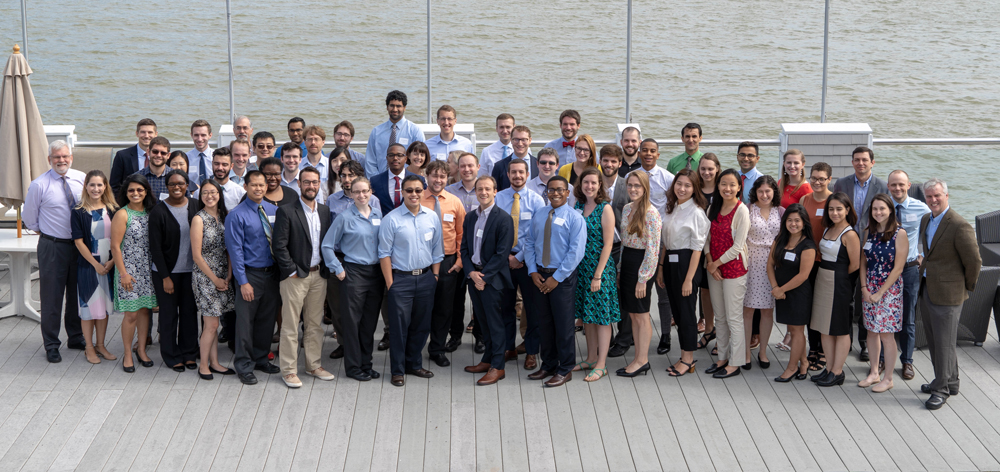
August 10, 2018 marked the Medical Scientist Training Program's 18th Annual Retreat. The retreat was held at the Rochester Yacht Club, overlooking Lake Ontario and the Genesee River.
The Annual Retreat is an opportunity for the entire program to touch base and welcome incoming students. This year, the MSTP welcomed 8 new students: Catherine Beamish, Wash U., Zachary Christensen, UR 2nd year med. (Brigham Young U.), Ankit Dahal (U. Penn), Adam Geber (Columbia U.), Emily Isenstein (Cornell U.), Bryan Redmond (Xavier U.), Alison Roby (Penn St.), Matt Sipple (Cornell U.).
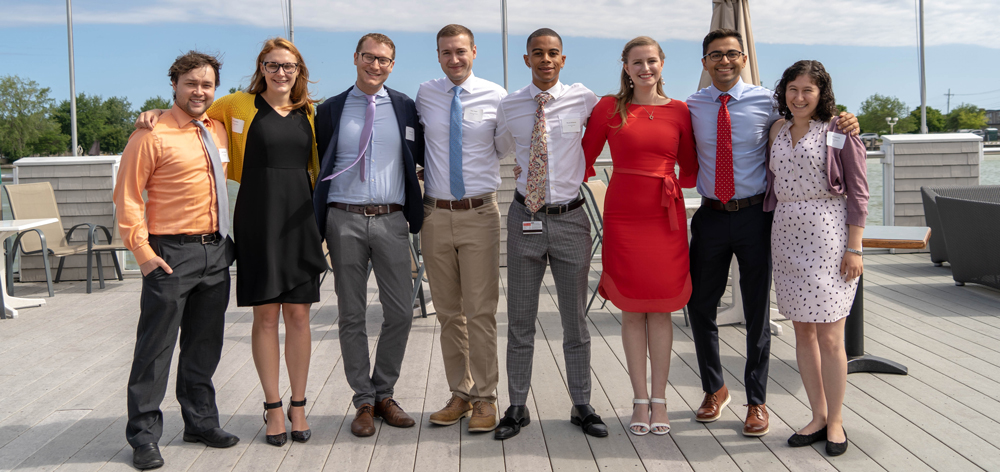
2018 MSTP Incoming Students
The Keynote this year ("Iterations of cross-talk direct differentiation in development") was given by former URMC MSTP Student, Alan P. Kenny, MD, PhD, Assistant Professor, Pediatrics (Neonatology) at the University of Cincinnati Children's Hospital, Cincinnati, OH. Dr. Kenny focuses his research on elucidating the molecular mechanisms controlling the earliest stages of respiratory and digestive organ development. Available evidence suggests that early lung, liver, and pancreas lineages develop from a pool of foregut progenitor cells in the ventral endoderm. They are induced by FGF and BMP signals emanating from the cardiogenic mesenchyme during early somite stages of development through a mechanism that is highly conserved among vertebrates.
Following the keynote, the morning science session concluded with several short-format research talks by Mark Kenney(M2, lab rotation, Summer 2018 - Edward Schwarz, PhD), Jonathan Gigas (G1, Vera Gorbunova, PhD), Karl Foley ( G2, Houhui Xia, PhD), Matthew Tanner (G3, Charles Thornton, MD), Colleen Schneider (G4, Bradford Mahon, PhD), and Evan McConnell, PhD (M3, Maiken Nedergaard, DMD, PhD).
After lunch, the program convened for a business meeting. Attendees of the Keystone MD/PhD Student Conference and the Class Council representative for American Physician Scientist Association (ASPA) reported on their trips to annual meetings and upcoming events. New Student Council members were elected at the end of the afternoon.
After closing the meeting, MD/PhD students met for conversation and drinks overlooking the water. Another successful year for the program!
NGP Student Monique Mendes Selected as a Neuroscience Scholars Program Fellow
Tuesday, August 7, 2018
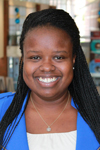 Monique was selected by the Society for Neuroscience's Professional Development Committee and its Diversity in Neuroscience Subcommittee as a Neuroscience Scholars Program Fellow. This program is designed to provide underrepresented graduate students in neuroscience with career development and networking opportunities to help them with success going into the future.
Monique was selected by the Society for Neuroscience's Professional Development Committee and its Diversity in Neuroscience Subcommittee as a Neuroscience Scholars Program Fellow. This program is designed to provide underrepresented graduate students in neuroscience with career development and networking opportunities to help them with success going into the future.
The program provides the following benefits:
- A mentoring team consisting of a senior mentor and a member of the Diversity in Neuroscience Subcommittee. The team will discuss a fellow's research, career plans, and overall experience.
- Two years of complimentary SfN membership.
- A travel award to attend the SfN annual meeting each fall during the two-year program.
- Up to $1500 in enrichment funds to support allowed professional development activities.
Congratulations Monique!
Edward Ayoub, CMPP graduate student in the laboratory of Dr. Archibald S. Perkins, was awarded an NRSA F31 beginning 8/1/18
Monday, July 23, 2018
Edward Ayoub - Recipient of a Two-Year Ruth L. Kirschstein National Research Service Award (NRSA)
Individual Predoctoral Fellowship (F31) August 1, 2018 -- July 31, 2020
Thursday, July 19, 2018
Edward Ayoub, graduate student in the laboratory of Dr. Archibald S. Perkins was awarded a two-year Ruth L. Kirschstein National Research Service Award (NRSA) Individual Predoctoral Fellowship entitled, "Therapeutic Strategies for Anemia in 3q26 Rearranged Leukemia".
Project Summary
According to the most recent NIH Cancer Statistics Review, leukemia, a cancer of blood cells, is the ninth most common type of cancer. Acute myeloid leukemia (AML) is an aggressive form of leukemia with high lethality (~75% of patients die 5 years after being diagnosed) characterized by anemia, and excessive proliferation of abnormal myeloid progenitor cells in the bone marrow (BM). Rearrangements of the chromosomal band 3q26 portend further reduction in survival, and lead to the overexpression of the oncogene Ecotropic Viral Integration Site 1 (EVI1). The severity of 3q26 rearranged AML, the lack of in-depth understanding of the role of EVI1 in leukemia, and the inadequate therapeutic strategies interested our lab and others to investigate EVI1 associated leukemogenesis. While previous groups used transplantation of BM virally transduced to overexpress EVI1, we are the first lab to recapitulate the effects of the 3q26 rearrangements in the mouse by establishing an inducible EVI1-overexpression model, which has provided us with new insights into the mechanisms by which EVI1 induces leukemia. We concluded using our in vivo and in vitro models that EVI1 causes myeloid expansion and blocks both erythropoiesis and lymphopoiesis. As an insight to the molecular mechanism, we previously documented that EVI1 binds to GACAAGATA, which overlaps with the binding site of the master regulator of erythropoiesis GATA-1. Additionally, our data indicate that EVI1 upregulates a previously published GATA-1 blocker, PU.1, and we showed that EVI1 binds to an enhancer upstream of PU.1 encoding gene (Spi-1). Thus, we hypothesize that EVI1 blocks erythroid differentiation by two mechanisms: 1) directly competing with GATA-1 for key genomic binding sites harboring EVI1/GATA-1 overlap motifs and 2) binding to Spi-1 enhancer and upregulating PU.1, which suppresses GATA1 function. We will investigate both hypothesized mechanisms using cutting edge techniques including ChIP-seq, ATAC-seq, and CRISPR under the training of my sponsor and collaborator. In order to translate the proposed mechanistic insights into clinical settings and therapeutic strategies, we will perform CRISPR library screening using an in vivo model to identify genes that reverse erythropoiesis blockage associated with EVI1-overexpression.
In summary, this fellowship will focus on investigating erythropoiesis blockage and resulting anemia that might explain the increased lethality associated with 3q26 rearranged leukemia, and It will unveil new therapeutic strategies that reverse the leukemia-associated anemia.
New Frontiers in Research
Tuesday, July 10, 2018
Stephen Dewhurst, Ph.D., Vice Dean for Research
One of the great pleasures of serving as Vice Dean for Research is the opportunity to learn about - and share - the cutting edge research that's being done here at the Medical Center. I've recently spoken with alumni, trustees and friends of the University across the country, as well as to key partners (and potential partners) for our new Empire Discovery Institute. Each time, it's been tremendous fun to have colleagues explain to me the science that most excites them - and to then watch how it resonates with diverse audiences.
Today, I'm starting a new column that's intended to share some of the stories, breakthroughs and discoveries that are being made by the 3,000 researchers who work here.
In diverse fields, ranging from neuroscience, to cancer immunotherapy, to musculoskeletal research, to RNA biology, and immunology and infectious disease, Medical Center researchers are at the forefront of their fields. For example: our basic scientists are unraveling the fundamental processes that regulate RNA metabolism and the trafficking of immune cells through tissue, while our Center for Health and Technology (CHeT) is working to enable anyone anywhere to receive care, participate in research, and benefit from resulting advances.
Another area of remarkable strength is in augmented and virtual reality (AR/VR). Multi-disciplinary teams spanning computer science, engineering, neuroscience, ophthalmology and visual sciences are creating complex virtual environments that will enable us to better understand how the brain integrates sensory data, and how that can be used to treat a wide range of neurological and neuropsychiatric conditions.
In the coming months, I hope to go into greater depth about these and other advances - and to share details of how Medical Center researchers are advancing our understanding of fundamental biological processes, translating discoveries into new treatments, and leading the way in improving clinical and population-level care.
Isaac Fisher, 5th year graduate student in the lab of Alan V. Smrcka, won first place for his poster at the EB/ASPET meeting in San Diego
Monday, July 9, 2018

Congratulations to Isaac Fisher, a 5th year student in the laboratory of Dr. Alan V. Smrcka for receiving First Place in the Postbaccalaureate/Graduate Student category within the Division for Molecular Pharmacology! We applaud your contributions to ASPET's 2018 Student Competition.
The winners of the awards for the ASPET Student Poster Competition were announced at the Division Mixer on Tuesday, April 24 at EB 2018 in San Diego.
Poster Details
Title: Hydrogen Deuterium Exchange Mass Spectrometry Reveals Distinct Activation States of PCLb by G-Protein
Authors: Isaac Fisher, Meredith Jenkins, Greg Tall, John Burke, and Alan V. Smrcka

See Awards on ASPET website
MSTP Student Wins Research Award from American Heart Association
Thursday, June 21, 2018
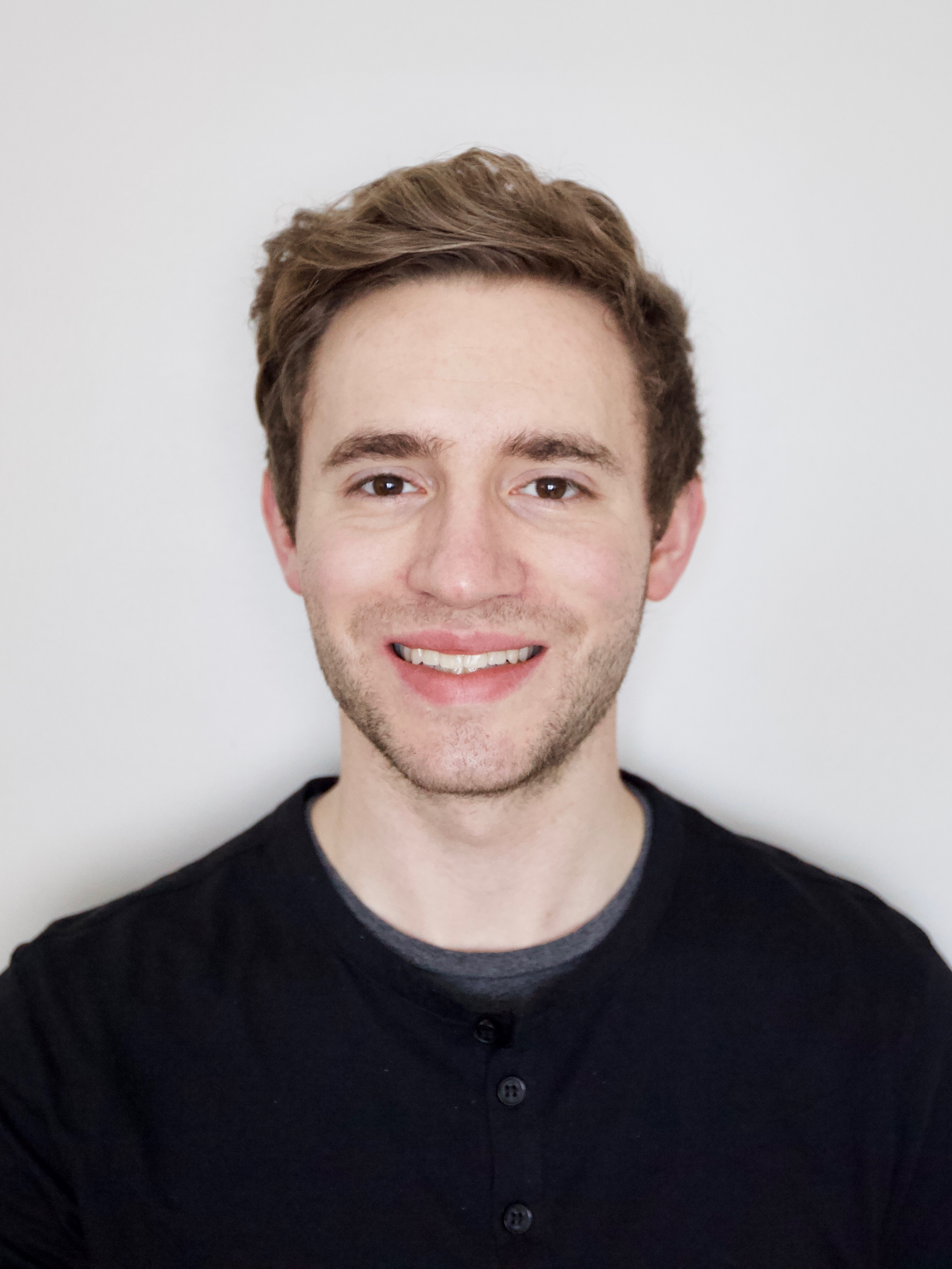
Jonathan Bartko, MS has received a two-year Predoctoral Fellowship Award from the American Heart Association (AHA).
Bartko is an MD/PhD candidate currently in his second year of the Cell Biology of Disease (Pathology) Graduate Program as part of the Medical Scientist Training Program (MSTP) at the University of Rochester.
He currently works in the lab of Marc Halterman, M.D., Ph.D. which specializes in stroke and cardiac arrest research. Bartko's current project is entitled, "BDNF-TrkB Regulation of ER-Dependent Death in the Peri-Ischemic Cortex."
NGP Student Receives Ruth L. Kirschstein Predoctoral Individual National Research Service Award
Thursday, June 21, 2018
 Rianne Stowell, a fourth year NGP graduate student, has been awarded a two year NIH Fellowship award (F31) for her project titled, "Noradrenergic modulation of microglial dynamics and synaptic plasticity". Rianne works in the laboratory of Ania Majewska, Ph.D.
Rianne Stowell, a fourth year NGP graduate student, has been awarded a two year NIH Fellowship award (F31) for her project titled, "Noradrenergic modulation of microglial dynamics and synaptic plasticity". Rianne works in the laboratory of Ania Majewska, Ph.D.
The purpose of the Kirschstein National Research Service Award program is to enable promising predoctoral students with potential to develop into a productive, independent research scientists, to obtain mentored research training while conducting dissertation research.
Well done Rianne!
Event Recap: Pathology Research Day 2018
Monday, June 18, 2018
The annual Pathology Research Day event at the University of Rochester Medical Center was held on Monday, June 11, 2018.
The day included more than 50 poster presentations in addition to 12 oral presentationsgiven by Pathology residents and fellows, and graduate students in the Cell Biology of Disease Ph.D. Program.
This year's keynote speaker was Andrew Folpe, M.D. who is professor and consultant for Anatomic Pathology at Mayo Clinic. His engaging and informative talk was titled, "Phosphaturic Mesenchymal Tumors: What I Have Learned." A video recording of the keynote is available online (note: UR login is required to view).
The graduate program gave out several awards at a special reception at the end of the day, per below.
View Event Photos
Graduate Program Awards
- Outstanding Academic Excellence by a First Year Student -- David Villani, MS
- Outstanding Program Contribution -- Sarah Catheline, MS
- Robert Mooney Thesis Award -- Irena Lerman, Ph.D.
Travel Award for Oral Presentation
Poster Presentation Travel Awards
- Robert Hoff, MS
- Allison Li, MS
- Xi Lin, MS
- Robert Maynard, MS
Biochemistry & Biophysics Students Going Places
Tuesday, June 12, 2018
By Dr. Joseph Wedekind
The Department of Biochemistry & Biophysics is pleased to announce the winners of the Sayeeda Zain Fall Travel awards: Debapratim Dutta, Sierra Fox and Hong Zhu.
The Sayeeda Zain Travel Award honors the distinguished career and charitable life of Dr. Sayeeda Zain. The award is given in recognition of research excellence to support travel and related expenses associated with attendance at a scientific conference or corporate internship to gain practical experience.
Debapratim (Dave) Dutta is presenting a poster and was invited to give a talk at the Annual RNA Society Meeting (Berkeley, CA). Sierra Fox presented a poster and was a Keystone Symposia Future of Science Fund Scholarship recipient at the Keystone Symposia in Chromatin Architecture and Chromatin Organization, and Gene Control in Development and Disease Symposia (Whistler, BC, Canada). Hong Zhu presented a poster at the III International Conference on Vaccines Research and Development (Washington, DC).

Debapratim (Dave) Dutta
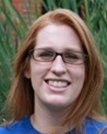
Sierra Fox
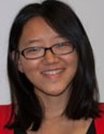
Hong Zhu
Neuroscience Grad Student Awarded NIH Diversity Fellowship
Tuesday, June 12, 2018
 Monique S. Mendes, a neuroscience Ph.D. student, is the first University of Rochester Medical Center (URMC) graduate student to receive a prestigious diversity award from the National Institute of Neurological Disorders in Stroke (NINDS). Mendes works in the laboratory of Ania Majewska, Ph.D. and studies the role that the brain's immune cells play in development, learning, and diseases like Autism.
Monique S. Mendes, a neuroscience Ph.D. student, is the first University of Rochester Medical Center (URMC) graduate student to receive a prestigious diversity award from the National Institute of Neurological Disorders in Stroke (NINDS). Mendes works in the laboratory of Ania Majewska, Ph.D. and studies the role that the brain's immune cells play in development, learning, and diseases like Autism.
Mendes, originally from Kingston, Jamaica, received her undergraduate degree in Biology from the University of Florida. She came to URMC in search of a robust program that focused on glial biology and a collaborative environment. She chose the Del Monte Institute for Neuroscience to complete her thesis work due in part to Majewska's record of mentoring students and her lab's reputation for conducting leading research in brain development.
Mendes has been awarded a F99/K00 NIH Blueprint Diversity Specialized Predoctoral to Postdoctoral Advancement in Neuroscience (D-SPAN) fellowship from NINDS. The award was created to provide outstanding young neuroscientists from diverse backgrounds a pathway to develop independent research careers. Unlike traditional graduate student fellowships, this award provides research funding for 6 years, including dissertation research and mentored postdoctoral research career development.
Read the local Jamacian Observer newspaper article.
GSS Annual Poster Session - Travel Award Winners Announced
Thursday, June 7, 2018
Congratulations to our most recent GSS poster session Travel Award Winners!
Lara Terry, 3rd year student in David Yule Lab: 2nd place -- Title: Effects of Missense Mutations on Inositol 1,4,5-trisphosphate Receptor Mediated Calcium Release.
Si Chen, 4th year student in Chen Yan lab: 3rd place -- Title: PDE10A Inhibition and Deficiency Attenuate Pathological Cardiac Remodeling
Fourth year NGP Graduate Student Publishes in Journal of Neuroscience
Tuesday, May 29, 2018
Fourth year NGP graduate student Patrick Miller-Rhodes (Gelbard lab) has recently published a single author review in Journal of Neuroscience (Journal Club, J Neurosci. 2018 38(19):4457-- 4459) tackling the fascinating and timely topic of the heterogeneity of microglial mechanisms that contribute to normal brain functions such as synaptic plasticity. In this publication, Patrick highlights a recent study by NGP alumna Rebecca Lowery (Majewska lab; Glia 65(11):1744-1761), showing that microglial CX3CR1 loss does not affect multiple forms of plasticity, to make his point that the mechanisms microglia use to support neuronal function are likely diverse and differ based on brain region and developmental stage.
Congratulations Patrick and go NGP!
Outstanding Dissertations Honored
Wednesday, May 23, 2018
Wishing our graduates well at the 2018 Commencement Dinner
Wednesday, May 23, 2018
The 2018 Ph.D.Commencement Dinner was held at the Daisy Flour Mill. Following introductions from Edith Lord, Senior Associate Dean for Graduate Education and Jennifer Stripay, representing the University of Rochester Alumni Council, Awards were presented to three graduating PhD students:
Vincent du Vigneaud Award: Anthony DiPiazza, Microbiology and Immunology, "Insights into CD4 T Cell-Mediated Immunity to Influenza Viruses." The award is conferred by the Office of Graduate Education to a graduating student whose thesis is judged superior and unique in potential for stimulating and extending research in the field.
Wallace O. Fenn Award: Benjamin Plog, Pathology, "Novel Insight into Regulation of Glymphatic Flow with Implications for Traumatic Brain Injury." The award is given annually to a graduating student judged to have performed especially meritorious research and who presented a Ph.D. thesis suitable to honor the name of Wallace Fenn, former professor and chair of physiology.
Marvel-Dare F. Nutting Award (recognizing an outstanding Biochemistry PhD): Amber Cutter, whose PhD dissertation was on "Molecular Characterization of Nucleosome Recognition by Linker Histone H1.0."
Commencement Dinner Photos

Pharmacology Alumni Named Associate Dean
Friday, May 11, 2018
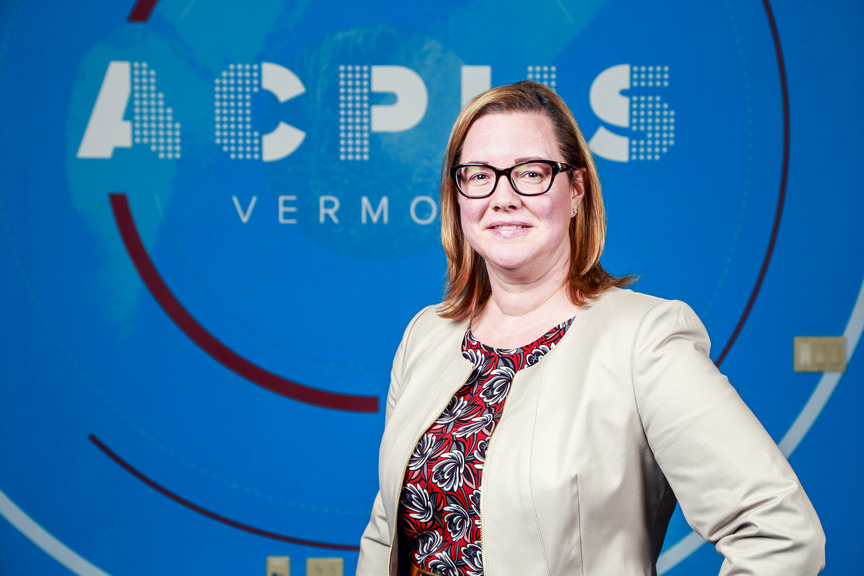 Jennifer Mathews, PhD has been named the Associate Dean for the Albany College of Pharmacy and Health Sciences - Vermont Campus.
Jennifer Mathews, PhD has been named the Associate Dean for the Albany College of Pharmacy and Health Sciences - Vermont Campus.
Dr. Mathews earned her doctorate in Pharmacology from the University of Rochester in 2007, her field(s) of interest as a student were Neuropharmacology, Opioid receptors, Pain, Tolerance, Antinociception
Her responsibilities will include execution of the pharmacy program; supervision of faculty; campus operations; and coordination of the development, implementation, and assessment of initiatives that support the programs on the Vermont Campus, which also include a Master's program in Pharmaceutical Sciences.
Congratulations to Dr. Mathews!
Deborah Cory-Slechta Receives Lifetime Achievement Award in Graduate Education
Monday, May 7, 2018
As a faculty member at the School of Medicine and Dentistry, Deborah Cory-Slechta holds professorship positions in the departments of Environmental Medicine, Pediatrics, and Public Health Sciences. A former chair of the Department of Environmental Medicine and principal investigator of the department's National Institute of Environmental Health Sciences Center, Cory-Slechta has been nationally and internationally recognized for her scientific contributions.
Considered one of the medical school's most distinguished faculty members, Cory-Slechta served in leadership roles for several Ph.D. programs, where she also teaches key graduate courses. As the recipient of a Women's Health and the Environment over the Entire Lifespan grant, she oversees a career development and mentoring initiative for junior faculty members.
Widely regarded for her research on the consequences of developmental exposures to environmental chemicals on brain development and behavior, she has examined the effects of exposures to metals, pesticides and air pollutants. That work—particularly her groundbreaking research on the biological effects of exposure to lead—has had important regulatory and policy implications.
After earning her undergraduate and master's degree at Western Michigan University, she received her PhD at the University of Minnesota. Following a postdoctoral fellowship at Rochester, she joined the University in 1982.
Students Present 'Groundbreaking and Transformative' Research at Expo
Friday, May 4, 2018
At the annual Undergraduate Research Exposition, students presented projects on topics ranging from fluid dynamics, deforestation in Bolivia, and nomad cultures in Morocco, to prenatal depression, meteorites, and software that affects education. President's Award winners Lauren Oey '18 (left), Harrah Newman '18, Yiyun Huang '18, and Perry DeMarche '18 were among the students honored at the event.
Pathology Graduate, Ben Plog, Ph.D., Receives 2018 Fenn Award
Wednesday, May 2, 2018
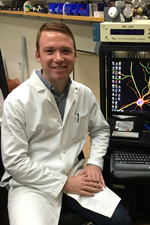 Ben Plog, Ph.D. has been named the recipient of the distinguished Wallace O. Fenn Award. Named after the late University Physiology professor and chair, the award is given to a graduating student whose Ph.D. research and thesis honor the name and work of Dr. Fenn.
Ben Plog, Ph.D. has been named the recipient of the distinguished Wallace O. Fenn Award. Named after the late University Physiology professor and chair, the award is given to a graduating student whose Ph.D. research and thesis honor the name and work of Dr. Fenn.
Plog was a medical science training program (MSTP) student who entered the Pathology graduate program in 2012 to work in the lab of Maiken Nedergaard, M.D., D.M.Sc. in the Center for Translational Neuromedicine and Neurosurgery. Having defended his thesis (titled Novel Insight into Regulation of Glymphatic Flow with Implications for Traumatic Brain Injury), Plog has returned to Medical School to continue his Medical School training and will be part of 2018 Ph.D. degree conferral.
Neuroscience Graduate Student publishes paper with the Briggs lab
Friday, April 27, 2018
Neuroscience Graduate student Allison Murphy co-authored a paper with the Briggs lab while in a rotation with the lab. Allison contributed an extensive amount of work toward the paper during her fall rotation, and the paper was accepted shortly after her joining the lab.
Postdoctoral fellow, Mike Hasse was the first author on the paper, "Morphological heterogeneity among corticogeniculate neurons in ferrets: quantification and comparison with a previous report in macaque monkeys."
Nice work Allison and Mike!!
The Center for the Integration of Research, Teaching and Learning (CIRTL) Events
Wednesday, April 25, 2018
One of the many sponsored programs within the Center for Professional Development in the School of Medicine &
Dentistry is The Center for the Integration of Research, Teaching and Learning (CIRTL). CIRTL is an NSF-funded
consortium of 42 PhD granting institutions around the country, whose aim it is to advance the teaching of STEM
disciplines in higher education by preparing future faculty. CIRTL uses graduate and
postdoc level research trainees as the leverage point to develop national Science, Technology, Engineering, and
Mathematics (STEM) faculty committed to implementing and advancing effective teaching practices for diverse
student audiences as part of successful professional careers. The goal of CIRTL is to improve the STEM learning
of all students at every college and university, and thereby to increase the diversity in STEM fields and the
STEM literacy of the nation.
CIRTL provides a number of online workshops, courses, and educational experiences throughout the year. Graduate
students and postdocs interested in teaching are encouraged to participate in CIRTL events. For more information
about CIRTL, please visit rochester.edu/college/cetl/cirtl/.
Upcoming CIRTL Events Include…
Center for the Integration of Research, Teaching and Learning (CIRTL) @ UR Research Day
Wednesday, May 23 | 9:00 am-5:00 pm | River Campus
Center for the Integration of Research, Teaching and Learning (CIRTL) @ UR will be hosting its annual Research
Day and all trainees interested in participating are invited to attend. Kevin Kelly's LinkedIn profile provides
an overview of his work in eLearning. The day's agenda will include examining teaching through a research
lens, optimizing course design, using technology to assess learning in the classroom, using technology to engage
diverse learners, and using technology to share course content. Register
for this event. Trainees with an interest in teaching are highly encouraged to attend. For
a full overview of the days agenda and workshop descriptions, please contact Dr. Jenny Hadingham at jennifer.hadingham@rochester.edu or
(585) 276-5998.
The Bugs in Your Gut Could Make You Weak in the Knees
Tuesday, April 24, 2018
A Prebiotic May Alter the Obese Microbiome and Protect Against Osteoarthritis
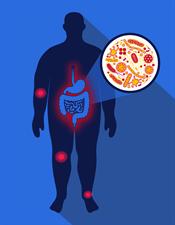
The obese microbiome may be a
key driver of osteoarthritis and a
prebiotic supplement may turn
things around.
Bacteria in the gut, known as the gut microbiome, could be the culprit behind arthritis and joint pain that plagues people who are obese, according to a new study published today in JCI Insight.
Osteoarthritis, a common side effect of obesity, is the greatest cause of disability in the US, affecting 31 million people. Sometimes called "wear and tear" arthritis, osteoarthritis in people who are obese was long assumed to simply be a consequence of undue stress on joints. But researchers at the University of Rochester Medical Center provide the first evidence that bacteria in the gut -- governed by diet -- could be the key driving force behind osteoarthritis.
The scientists found that obese mice had more harmful bacteria in their guts compared to lean mice, which caused inflammation throughout their bodies, leading to very rapid joint deterioration. While a common prebiotic supplement did not help the mice shed weight, it completely reversed the other symptoms, making the guts and joints of obese mice indistinguishable from lean mice.
Read Full Article
Brandon Berry Recipient of a two-year American Heart Association Predoctoral Fellowship & Professional Member of the AHA July 1, 2018 – June 30, 2020
Monday, April 23, 2018
Brandon Berry, graduate student in the laboratory of Dr. Andrew P. Wojtovich was awarded a two-year American Heart Association Predoctoral Fellowship entitled, "Optogenetic Control of Mitochondrial Function to Protect Against Ischemia Reperfusion Injury".
Project Summary
Mitochondria are central mediators of cell death following the pathologic stress of ischemia reperfusion (IR) injury during heart attack or stroke. However, mitochondria can be targeted with specific interventions that inhibit cell death following IR. The mitochondrial protonmotive force (PMF) is coupled to ATP synthesis, and controls ion gradients and oxidative stress. Dissipation of the PMF in IR injury results in cellular damage and death. Interestingly, mild uncoupling of the PMF from ATP synthesis using low-dose protonophores protects against IR injury. It is unclear whether uncoupling triggers protective signaling, or if uncoupling itself is the effector of protection. Further, pharmacologic tools lack temporal and spatial control, obscuring when and where uncoupling is sufficient to protect against IR injury. Uncoupling mitochondria using optogenetics addresses the spatiotemporal challenge of using protonophores. Spatiotemporal control can determine if the mechanism of uncoupling confers protection before ischemia (preconditioning), during ischemia, during reperfusion, or after reperfusion (postconditioning). Overall, using our novel optogenetic tools, this project aims to test how precise, selective, reversible uncoupling is sufficient to elicit cellular responses that protect against IR injury.
Neuroscience Graduate Student Receives American Heart Association Pre-Doctoral Fellowship
Monday, April 23, 2018
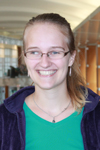
Kathleen Gates has been awarded an American Heart Association Predoctoral Fellowship. This fellowship is meant to enhance the integrated research and clinical training of promising students who are matriculated in pre-doctoral or clinical health professional degree training programs and who intend careers as scientists, physician-scientists or other clinician-scientists, or related careers aimed at improving global cardiovascular health.
Congratulations Kathleen!!
April 23rd - Genetics Day 30th Annual Scientific Symposium
Friday, April 20, 2018
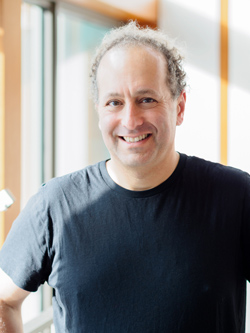 Mark your calendars for the 30th annual Genetics Day! The 16th annual Fred Sherman Lecture will be delivered by Michael Eisen, PhD, from Berkeley University. You and your colleagues are invited to submit your posters for the Genetics Day poster session to be held 12:00 -- 2:00pm on Monday, April 23, 2018. Cash prizes will be awarded to select graduate student and postdoc posters.
Mark your calendars for the 30th annual Genetics Day! The 16th annual Fred Sherman Lecture will be delivered by Michael Eisen, PhD, from Berkeley University. You and your colleagues are invited to submit your posters for the Genetics Day poster session to be held 12:00 -- 2:00pm on Monday, April 23, 2018. Cash prizes will be awarded to select graduate student and postdoc posters.
New Fellowship Opportunity: TRIUMPH Post-doctoral Fellowship - MD Anderson Center
Wednesday, April 18, 2018
TRIUMPH (Translational Research In Multidisciplinary Program) Post-doctoral Fellowship
The Cancer Prevention & Research Institute of Texas (CPRIT) TRIUMPH Postdoctoral Fellowship Program is a post-doctoral program providing unique training in clinical and translational research. The immediate goal of our program is to recruit talented, productive, well-trained PhDs and train them through didactic course work as well as clinical rotations and a unique mentorship to pursue clinical and/or translational research. A long-term goal of this program is to produce scientists who can be paired with suitable physician scientists to co-PI a research laboratory.
This is a three-year training program. First year postdoctoral fellows participate in a series of didactic clinical course work offered at the MD Anderson UTHealth Graduate School (GSBS), MD Anderson Cancer Center, or the UTHealth McGovern School of Medicine and strategically matched clinical rotations, while pursuing research in a basic or translational research laboratory. Second and third year fellows are co-mentored by a basic science/translational scientist mentor and a physician/clinical scientist mentor on clinical/translational research projects. The TRIUMPH postdoc will obtain a certificate upon successful completion of the program. The expectation for our post-docs is that by the end of their 3-year training, they will have first authored at least 2 papers in high impact journals. Our multidisciplinary training program will award a certificate upon completion.
Please visit the TRIUMPH website for additional information
Thesis competition winner describes protein translation in 3 minutes or less
Wednesday, April 18, 2018
Jillian Ramos showed exactly how to capture an audience's attention -- and hold it -- at the University of Rochester's third annual Three Minute Thesis Competition finals.
As a result, the PhD student in assistant professor Dragony Fu's biology lab walked away with not only the $750 first place prize awarded by a panel of faculty judges, but the $250 people's choice prize awarded by an audience that filled all but a few seats in the Class of '62 Auditorium.
Read The Full Article
Eight Finalists Confirmed for Three Minute Thesis Competition
Friday, April 6, 2018
Communicating research with three minutes and a slide
At a time when it is more important than ever for scientists to communicate clearly with the public, eight University PhD students and postdocs will do their best to summarize their research with just three minutes and a slide.
They are finalists in the University's annual Three Minute Thesis competition, which will be held at 4 p.m., next Thursday, April 12, in the Class of '62 Auditorium at the Medical Center.
A total of 44 students initially entered the competition, which was founded at University of Queensland, and is now in its third year at Rochester. The eight finalists are:
The winner will receive a $750 research travel award. There are also $500 and $200 research travel awards, respectively, for the runner-up and the people's choice winner.
McMurray Named Associate Director of Pathology Graduate Program
Wednesday, March 28, 2018
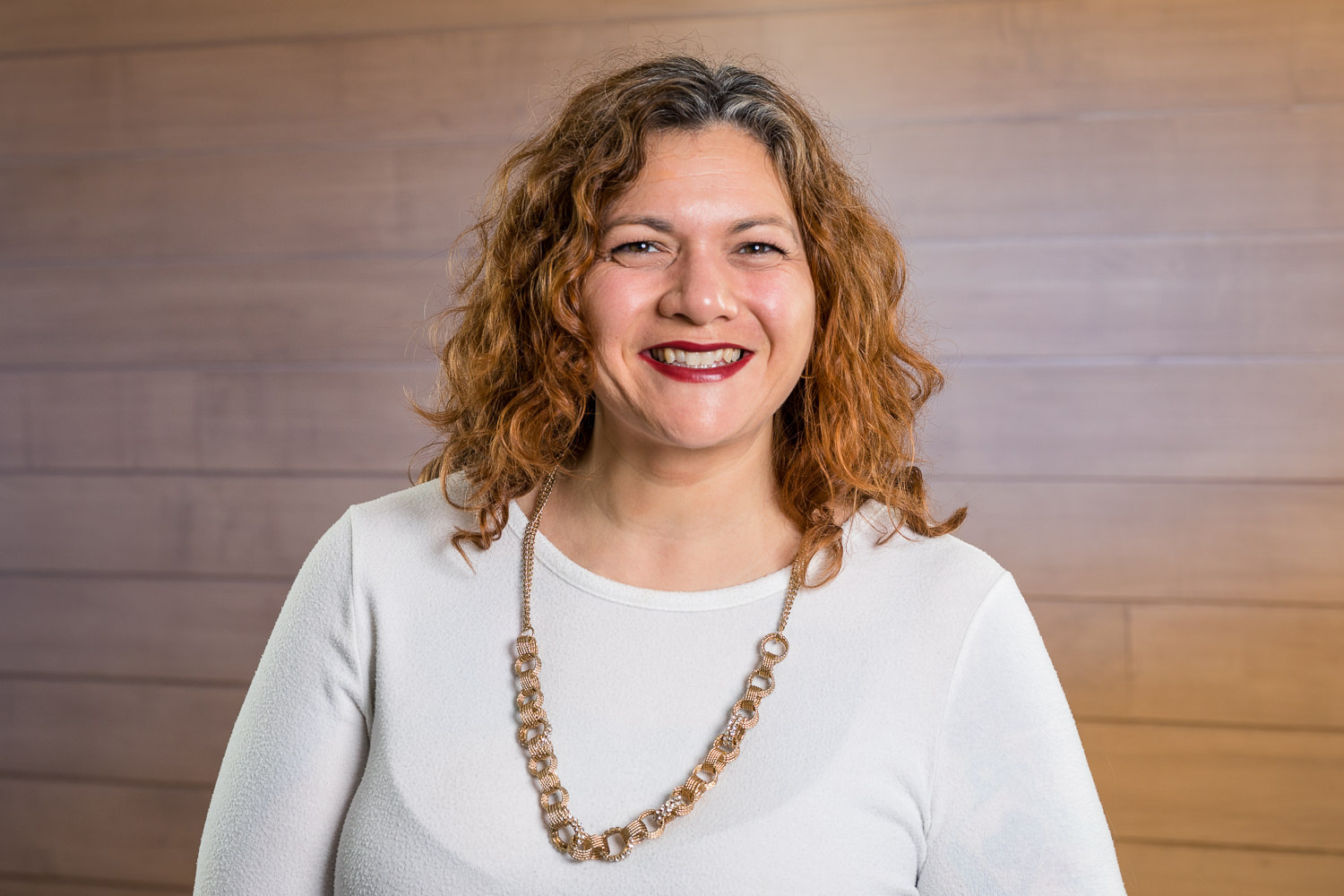 Helene McMurray, Ph.D., has been named the new associate director of the Cell Biology of Disease (Pathology) Graduate Program at the University of Rochester, which became effective in March.
Helene McMurray, Ph.D., has been named the new associate director of the Cell Biology of Disease (Pathology) Graduate Program at the University of Rochester, which became effective in March.
Dr. McMurray is a clinical assistant professor with a primary appointment in Pathology and Laboratory Medicine. She currently serves as the Director-in-Training in the Tissue Typing/Histocompatibility Laboratory at Strong Memorial Hospital.
Her research collaborations with scientists in the Department of Biomedical Genetics focus on identification of vulnerabilities in cancer cells, and utilize approaches in genomics, bioinformatics, biostatistics, and genetics. As an educator, Dr. McMurray works to introduce students to these modern techniques in biomedicine.
Dr. McMurray will join Dr. Richard Libby (Opthalmology) who directs the program.
"Mentors and advisors have helped me imagine new possibilities in my science and in my career," said McMurray. "I wouldn't be who or where I am today without guidance from others. I am excited to take on this new role in the Cell Biology of Disease Graduate Program to try to share what I have learned with the next generation of scientists."
Alumni Spotlight on Dana Olzenak, PhD ‘15
Monday, March 26, 2018
Dana Olzenak McGuire, who graduated with a PhD in Epidemiology from the 2015 class was recently appointed to the role of public health director in St. Lawrence County. As public health director, Dr. Olzenak McGuire supervises about 30 employees including nurses, the county coroners and administrative staff.
Dr. Olzenak McGuire brings a wide range of disciplines into the new role with degrees in Physical therapy, an MBA and the PhD in Epidemiology.
Visit our Epidemiology PhD Program to learn more. Congratulations Dana!
"Epidemiology just sounded really interesting to me, It covers all diseases from environmental to infectious to chronic." - Dana Olzenak McGuire
Leader in the field of epigenetic regulation and cancer biology joins the Department of Biomedical Genetics and GDSC Program
Wednesday, March 7, 2018
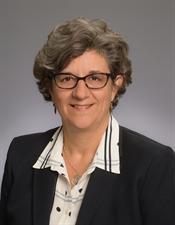 Dr. Paula Vertino, currently the leader of the Cancer Genetics and
Epigenetics Program at Emory University will be joining the University of Rochester Department in Biomedical
Genetics and the Wilmot Cancer Institute this summer. Dr. Vertino's research on cancer epigenetics will greatly
expand our areas of research strengths. She is an exceptionally important player in her field, and we look forward
to welcoming her to the GDSC program!
Dr. Paula Vertino, currently the leader of the Cancer Genetics and
Epigenetics Program at Emory University will be joining the University of Rochester Department in Biomedical
Genetics and the Wilmot Cancer Institute this summer. Dr. Vertino's research on cancer epigenetics will greatly
expand our areas of research strengths. She is an exceptionally important player in her field, and we look forward
to welcoming her to the GDSC program!
Cindy Wang Wins America’s Got Regulatory Science Talent Competition
Monday, March 5, 2018
 Xiaowen (Cindy) Wang, M.S., a graduate student in the Cellular and Molecular Pharmacology and Physiology PhD Program placed first in the 5th annual "America's Got Regulatory Science Talent" competition for her proposal "Dr. Data: An Integrated Drug Repurposing Database for Identifying New Indications of FDA Approved Drugs"
Xiaowen (Cindy) Wang, M.S., a graduate student in the Cellular and Molecular Pharmacology and Physiology PhD Program placed first in the 5th annual "America's Got Regulatory Science Talent" competition for her proposal "Dr. Data: An Integrated Drug Repurposing Database for Identifying New Indications of FDA Approved Drugs"
To read more about Cindy's proposal and the competition, please visit the CTSI Stories website.
Congratulations Cindy!
Janelle Veazey Receives F31 National Research Service Award From NIH
Sunday, February 18, 2018
Immunology graduate student Janelle Veazey, has received an F31 National Research Service Award from the NIH. This pre-doctoral fellowship will support her research investigating a new role for airway epithelial protein kinase D in anti-viral immunity.
Congratulations Janelle!
E-Cigarette Flavors Are Toxic to White Blood Cells, Warn Scientists
Thursday, February 1, 2018
A new study led by the Rahman lab and first author, Toxicology post-doctoral researcher, Dr. Thivanka Muthumalage, adds to growing evidence on the harmful health effects of e-cigarettes. Currently, the article has been viewed over 16,500 times (in just one day) and several news sources have written articles and reported about it across the globe.
The paper has been so well received that it is currently ranked in the top 5% of all research outputs ever tracked by Altmetric.
The study has revealed another potential health risk of e-cigarettes, finding that the chemicals used to flavour e-cigarette liquids are toxic to white blood cells. The study wanted to test the assumption that nicotine-free flavoured e-liquids are safer than smoking tobacco cigarettes, looking at what effect e-cigs might have on the immune system.
To do this the researchers directly exposed a type of white blood cell called monocytes, which help the body fight infection, to e-liquids. They found that e-cigarette flavoring chemicals and liquids can cause significant inflammation to monocytes, with many of the flavouring chemicals also causing significant cell death. Some flavours were found to be more harmful than others, with cinnamon, vanilla, and buttery flavours among the worst.
The researchers also found that mixing e-cigarette flavours has a much worse effect than exposure to just one flavour and caused the most toxicity to white blood cells.
The study's first author, Dr. Thivanka Muthumalage, commented on the findings, saying that although these flavouring compounds may be safe for ingestion, the results show they are not safe for inhalation and add to a growing body of evidence suggesting that e-cigarettes are harmful to health. Previous research has also found that the flavors used in e-cigarettes cause inflammatory and oxidative stress responses in lung cells.
Senior author Dr. Irfan Rahman expressed concern: "Our scientific findings show that e-liquid flavors can, and should, be regulated and that e-juice bottles must have a descriptive listing of all ingredients. We urge regulatory agencies to act to protect public health," he said, also warning that, "alluring flavour names, such as candy, cake, cinnamon roll and mystery mix, attract young vapers."
The team are now planning further research and are calling for further long-term human studies to understand better the harmful effects of e-cigarettes. The findings can be found published online in the journal Frontiers in Physiology.
To learn more please read the following articles:
Lungs Mays Hold Key to Thwarting Brain Damage after a Stroke
Wednesday, January 31, 2018
By Mark Michaud
The harm caused by a stroke can be exacerbated when immune cells rush to the brain an inadvertently make the situation worse. Researchers at the University of Rochester Medical Center (URMC) are studying new ways to head off this second wave of brain damage by using the lungs to moderate the immune system's response.
"It has become increasingly clear that lungs serve as an important regulator of the body's immune system and could serve as a target for therapies that can mitigate the secondary damage that occurs in stroke," said URMC neurologist Marc Halterman, M.D., Ph.D. "We are exploring a number of drugs that could help suppress the immune response during these non-infection events and provide protection to the brain and other organs."
Halterman's lab, which is part of the Center for NeuroTherapeutics Discovery, has been investigating domino effect that occurs after cardiac arrest. When blood circulation is interrupted, the integrity of our intestines becomes compromised, releasing bacteria that reside in the gut into the blood stream. This prompts a massive immune response which can cause systemic inflammation, making a bad situation worse.
While looking at mouse models of stroke, his lab observed that a similar phenomenon occurs. During a stroke blood vessels in the brain leak and the proteins that comprise the wreckage of damaged neurons and glia cells in the brain make their way into blood stream. The immune system, which is not used to seeing these proteins in circulation, responds to these damage-associated molecular patterns and ramps up to respond. Mobilized immune cells make their way into the brain and, finding no infection, nevertheless trigger inflammation and attack healthy tissue, compounding the damage.
The culprit in this system-wide immune response is neutrophils, a white cell in the blood system that serves as the shock troops of the body's immune system. Because our entire blood supply constantly circulates through the lungs, the organ serves as an important way station for neutrophils. It is here that the cells are often primed and instructed to go search for new infections. The activated neutrophils can also cause inflammation in the lungs, which Halterman suspects may be mistakenly identified as post-stroke pneumonia. The damage caused by activated neutrophils can also spread to other organs including the kidneys, and liver.
Andrew Cox Receives US Patent
Tuesday, January 30, 2018
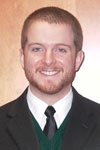
Andrew Cox
MD/PhD student, Andrew Cox has been awarded a patent, "Attenuated Influenza Vaccines and Uses Thereof" (9,787,032), for a new live flu vaccine that is safer than the current one so should permit higher dose administration to overcome the current problems with the live vaccine.
When not in medical school, Andrew is currently pursuing his degree in the Dewhurst lab, working on temperature sensitivity of Influenza polymerase as a determinant of pathogenicity.
Congratulations Andrew!
Inaugural Winners of the CPD Travel Award
Thursday, January 25, 2018
The Center for Professional Development (CPD) is excited to announce this year's winners of the CPD Travel Award. Congratulations to Valeriia Sherina, PhD student in Statistics and Cui Li, postdoctoral appointee in the Center for Translational Neuromedicine, for winning the inaugural CPD Travel Award! CPD would like to thank all the PhD students and postdoctoral appointees who submitted applications. Applications for the 2018-2019 academic year will be available in early spring.
Award Information
The Center of Professional Development (CPD) is sponsoring a CPD Travel Award for PhD students and postdoctoral appointees in the School of Medicine and Dentistry. Each travel award is worth up to $1500 and can be utilized for travel to a conference or for a professional development opportunity relevant to preparation for current or future career endeavors.
The Art of Science: Grad Student Finds Inspiration in Images of the Brain
Friday, January 12, 2018

The complex biology, networks, and symphony of signals that underlie human cognition are a font of endless mystery and wonder to those who study it. For Rianne Stowell, a graduate student in the lab of URMC neuroscientist Ania Majewska, Ph.D., these questions are also a source of artistic inspiration which has led to the creation of striking paintings of the brain's inner workings.
Stowell's most recent creation (above) is based on research which has recently been published in the journal Developmental Neurobiology and sheds new light on the role that immune cells called microglia play in wiring and rewiring the connections between nerve cells.
Stowell recalls wanting to pursue a career in art as far back as elementary school in Pennsylvania and while she carried that desire with her to Moravian College, she also began to explore other academic fields. Her interest in biology and psychology attracted her to a degree in neuroscience and that decision ultimately led her to the University of Rochester School of Medicine and Dentistry, where she is in now in her fourth year of graduate studies in pursuit of her Ph.D. in neuroscience.